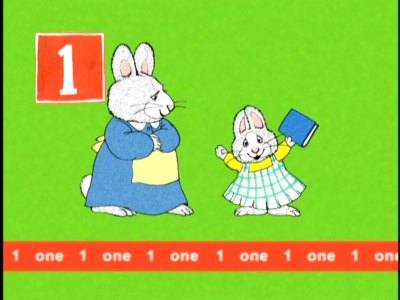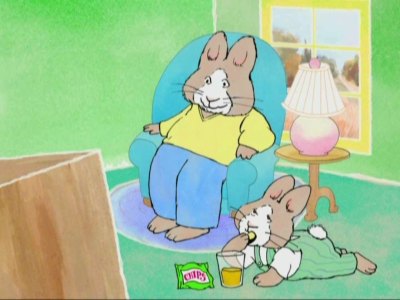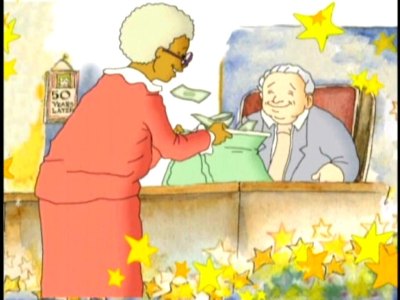| Reviews & Columns |
|
Reviews DVD TV on DVD Blu-ray 4K UHD International DVDs In Theaters Reviews by Studio Video Games Features Collector Series DVDs Easter Egg Database Interviews DVD Talk Radio Feature Articles Columns Anime Talk DVD Savant Horror DVDs The M.O.D. Squad Art House HD Talk Silent DVD
|
DVD Talk Forum |
|
|
| Resources |
|
DVD Price Search Customer Service #'s RCE Info Links |
|
Columns
|
|
|
Emily's First 100 Days of School...and More Great School Time Stories
Scholastic Video has released Emily's First 100 Days of School...and More Great School Time Stories, featuring two animated shorts inspired by children's author Rosemary Wells' work, as well as a third short written by David Schwartz and illustrated by Steven Kellogg that looks at our various forms of money. Since the DVD cover suggests these shorts are best suited for children aged three through seven, I had two of my younger child watch along to see their reactions. After all, a DVD like Emily's First 100 Days of School...and More Great School Time Stories is designed specifically for them; an adult reviewer may bring a whole different set of parameters to the review, and miss the basic kid appeal of the DVD.

The 35-minute Emily's First 100 Days of School plays very much like a counting game - a long counting game - with Emily and her family learning about counting to one hundred. Set up like CNN ("This is BNN: Bunny News Network!"), this short breaks up counting to one hundred by dividing up the number groups into tens, with announcements from the narrator to get ready for the next set of numbers. Then, illustrated examples of each number are presented, with a constant crawl at the bottom (like the headline news crawls that appear on cable news stations) showing that number drawn as well as spelled out.
The 10-minute Reading to Your Bunny looks at young Freddy Bunny, who would rather play video games than do anything else. His grades, naturally, start to suffer at school, until his teacher re-instructs his parents in the art of reading to Freddy. Soon, Freddy visits a library, and learns that he can check out books with a library card. Freddy's grades go up, and he spends quality time with his parents.
The 16-minute If You Made a Million looks at the various forms of money, starting with pennies and other coins, and works its way up to hundred dollar bills. The loose framework of the animated short shows how various combinations of different forms of money equal the same amount. It then advances, talking about working for your money, and how interest in a bank would grow your money, creating more than what you started with at the beginning.

Emily's First 100 Days of School...and More Great School Time Stories is really a hodgepodge of a collection, with If You Made a Million probably the odd man out here in the collection. Starting the lesson off with counting pennies, it held my children's attention at first because of its interesting graphic style and because the lessons were so simple. However, once the short started talking about interest at a bank, they were totally lost. I'm not sure what the point was in going so far afield in If You Made a Million, from pennies into more complex counting structures like compounded yearly interest - and they certainly didn't, either. The style of the drawings and their execution suggests little children for the intended audience, but then they're abandoned for a middle-school discussion of banking practices - and the middle-schooler in my house thought the animation was too "babyish" for him to watch. So, both intended audiences felt cheated.
Reading to Your Bunny was probably the least painful of the shorts, most notably because it was the shortest. Again, if the audience intended is supposed to be three to seven, the younger end of that group will need a shorter running time. The actual story is fairly annoying, at least to a parent, with young Freddy's parents coming off frankly like dolts, until they're re-educated on the benefits of reading for their child. Its slightly hectoring tone is one that I suspect most parents will resist.
But neither one of these two shorts put my kids to sleep as did Emily's First 100 Days of School. Clocking in at a mind-numbing 35-minutes, the set-up of the short is so repetitive and rote that I'm hard-pressed to understand why anyone would think a very small child would sit through it for its entirety. Based on one of Wells' book, I can see the concept working in that particular medium. The child is engaged with the material; the parent is interacting with the reader, and most importantly, you can put the book down at any point and resume at another time. Here, the filmmakers expect the young viewer to sit through the entire short, watching counting (instead of actually putting their fingers on the pages of a book) that goes on and on and on. Just to give you an idea of how dull Emily's First 100 Days of School is; my three-year-old lost interest at number 18, and my five-year-old went to play with her dolls at number 23. Later on in the day, neither one expressed interest in starting up the DVD again to finish the short. For a reviewer of a children's DVD, that about says it all.

The DVD:
The Video:
The full screen video image for Emily's First 100 Days of School...and More Great School Time Stories is perfectly adequate, with nice color balance, and little or no transfer issues.
The Audio:
The English mono soundtrack is fine for the job.
The Extras:
There's an exclusive interview with author Rosemary Wells, where she discusses her work. I can't imagine what child would want to watch this, but I suppose teachers may be interested. There's a music video from Mary Chapin Carpenter called Gonna Read to My Bunny included; the song is featured in Reading to Your Bunny. And there's a special "Read Along" function that really is just a subtitle function.
Final Thoughts:
With the hodgepodge nature of this collection, as well as the unsuccessful execution of the central, too-long short, you'd be better off finding some books that address these subjects aimed specifically at your child's age group. After all, as young Freddy learned: quit watching TV and read to your kids. I'm not even going to suggest a rental for Emily's First 100 Days of School...and More Great School Time Stories; if you see it at the library, you may want to borrow it. Otherwise, skip it, and get a good book on the subject at the library.
Paul Mavis is an internationally published film and television historian, a member of the Online Film Critics Society, and the author of The Espionage Filmography.


|
| Popular Reviews |
| Sponsored Links |
|
|
| Sponsored Links |
|
|
| Release List | Reviews | Shop | Newsletter | Forum | DVD Giveaways | Blu-Ray | Advertise |
|
Copyright 2024 DVDTalk.com All Rights Reserved. Legal Info, Privacy Policy, Terms of Use,
Manage Preferences,
Your Privacy Choices | |||||||














